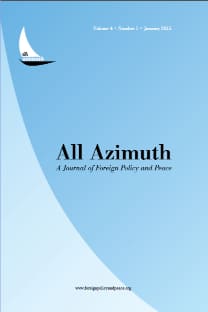Reflecting on the Reflectivist Approach to Qualitative Interviewing
Semi-structured interviewing, qualitative interviewing, reflexive approach to qualitative interviewing qualitative research,
___
- Alvesson, Mats. “Methodology for Close up Studies- Struggling with Closeness and Closure.” Higher Education 46 (2003): 167–93.
- Alvesson, Mats. “Beyond Neopositivists, Romantics, and Localists: A Reflexive Approach to Interviews in Organizational Research.” Academy of Management Review 28, no. 1 (2003): 13–33.
- Aydın Düzgit, Senem. “Legitimizing Europe in Contested Settings: Europe as a Normative Power in Turkey?” Journal of Common Market Studies. Accessed March 8, 2018. doi: 10.11/jcms.12647.
- Baker, Carolyn. “Membership Categorizations and Interview Accounts.” In Qualitative Research, edited by David. Silverman, 130–43. London: Sage, 1997.
- Brinkmann, Svend. Qualitative Interviewing. Oxford: Oxford University Press, 2013.
- Boşnak, Büke. “Europeanisation and De-Europeanisation Dynamics in Turkey: The Case of Environmental Organisations.” South European Society and Politics 21, no. 1 (2016): 75–90.
- Buzan, Barry, Ole Waever, and Jaap de Wilde. Security: A New Framework for Analysis. London: Lynne Rienner, 1998.
- Bürgin, Alexander. “Why the EU Still Matters in Turkish Domestic Politics: Insights from Recent Reforms in Migration Policy.” South European Society and Politics 21, no.1 (2016): 105–18.
- Caputo, John D. Radical Hermeneutics: Repetition, Deconstruction, and the Hermeneutic Project. Bloomington and Indianapolis: Indiana University Press, 1987.
- Diefenbach, Thomas. “Are Case Studies More Than Sophisticated Storytelling?: Methodological Problems of Qualitative Empirical Research Mainly Based on Semi-structured Interviews.” Quality & Quantity 43 (2009): 875–94.
- Grigoriadis, Ioannis N. Trials of Europeanization: Turkish Political Culture and the European Union. UK: Palgrave Macmillan, 2008.
- Irvine, Annie, Paul Drew, and Roy Sainsbury. “‘Am I Not Answering your Questions Properly?’ Clarification, Adequacy and Responsiveness in Semi-Structured Telephone and Face-to-Face Interviews.” Qualitative Research 13, no.1 (2012): 87–106.
- Kaliber, Alper. “De-Europeanisation of Civil Society and Public Debates in Turkey: The Kurdish Question Revisited.” South European Society and Politics 21, no. 1 (2016): 59–74. Kaliber, Alper, and Nathalie Tocci. “Conflict Society and the Transformation of Turkey’s Kurdish Question.” Security Dialogue 41, No. 2 (2010): 191–215.
- Keyman, E. Fuat. “Turkish Foreign Policy in the post-Arab Spring Era: From Proactive to Buffer State.” Third World Quarterly 37, no. 12 (2016): 2274–87.
- McLaren, Lauren M. and Meltem Müftüler Baç. “Turkish Parliamentarians' Perspectives on Turkey's Relations with the European Union.” Turkish Studies 4, no.1 (2003): 195–218.
- Onursal-Beşgül, Özge. “Policy Transfer and Discursive De-Europeanisation: Higher Education from Bologna to Turkey.” South European Society and Politics 21, no. 1 (2016): 91–103.
- Öniş, Ziya, and Şuhnaz Yılmaz. “Turkey and Russia in a Shifting Global Order: Cooperation, Conflict and Asymmetric Interdependence in a Turbulent Region.” Third World Quarterly 31, no. 1 (2016): 71–95.
- Öztürk, Ahmet Erdi, and Semiha Sözeri, “Diyanet As A Foreign Policy Tool: Evidence from the Netherlands and Bulgaria.” Politics and Religion. Accessed March 8, 2018. doi: 10.1017/S175504831700075X.
- Rapley, Timothy John. “The Art(fulness) of Open-ended Interviewing: Some Considerations on Analysing Interviews.” Qualitative Research 1 (2001): 303–23.
- Rumelili, Bahar, and E. Fuat Keyman. “Enacting Multi-Layered Citizenship: Turkey’s Armenians’ Struggle for Justice and Equality.” Citizenship Studies 20, no. 1 (2016): 67–83.
- Rumelili, Bahar, and Didem Çakmaklı. “Civic Participation and Citizenship in Turkey: A Comparative Study of Five Cities.” South European Society and Politics 22, no. 3 (2017): 365–84.
- Sarıgil, Zeki, and Ömer Fazlıoğlu. “Religion and Ethno-nationalism: Turkey's Kurdish Issue.” Nations and Nationalism 19, no. 3 (2003): 551–71.
- Sarıgil, Zeki. Ethnic Boundaries in Turkish Politics: The Secular Kurdish Movement and Islam. New York: New York University Press, 2018.
- Tocci, Nathalie, and Alper Kaliber. “Conflict Society and the Transformation of Turkey’s Kurdish Question.” SHUR Working Paper Series, 2008. Accessed August 7, 2017. http://www.luiss.it/shur/wp-content/uploads/2008/06/shurwp01-08.pdf.
- Zihnioğlu, Özge. European Union Civil Society Policy and Turkey: A Bridge Too Far? UK: Palgrave Macmillan, 2013.
- ISSN: 2146-7757
- Yayın Aralığı: 2
- Başlangıç: 2012
- Yayıncı: Dış Politika ve Barış Araştırmaları Merkezi, İhsan Doğramacı Barış Vakfı
Emre HATİPOĞLU, Osman Zeki GÖKÇE, İnanç ARIN, Yücel SAYGIN
Broadening the Horizons of the “International” by Historicizing it: Comparative Historical Analysis
Reflecting on the Reflectivist Approach to Qualitative Interviewing
Yücel SAYGIN, İnanç ARIN, Emre HATİPOĞLU, Osman Zeki GÖKÇE
Methodological Poverty and Disciplinary Underdevelopment in IR
